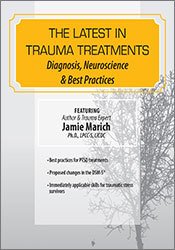

This cutting-edge seminar presents the new trauma paradigm and how best to use this information to help your traumatized clients. Join Dr. Jamie Marich to learn about:
This seminar will provide you with assessment skills and therapeutic techniques that are immediately applicable for traumatic stress survivors. If you work in an environment with any type of traumatic stress survivors and desire to increase your repertoire of therapies and techniques, then this seminar is for you!
This online program is worth 5.5 hours CPD.
| File type | File name | Number of pages | |
|---|---|---|---|
| Manual - Latest in Trauma Treatments (1.2 MB) | 55 Pages | Available after Purchase | |
| Manual - Latest in Trauma Treatments (1.2 MB) | 55 Pages | Available after Purchase |

Jamie Marich, PhD, LPCC-S, REAT, RYT-500, RMT, (she/they/we), began her career as a humanitarian aid worker in Bosnia-Hercegovina from 2000-2002, primarily teaching English and music. Jamie travels internationally teaching topics related to trauma, EMDR therapy, expressive arts, mindfulness, and yoga, while maintaining a private practice and online education operations in her home base of Akron, OH. Marich is the founder of the Institute for Creative Mindfulness and the developer of the Dancing Mindfulness approach to expressive arts therapy.
Marich is the author of EMDR Made Simple: 4 Approaches for Using EMDR with Every Client (2011), Trauma and the Twelve Steps: A Complete Guide for Recovery Enhancement (2012), Creative Mindfulness (2013), Trauma Made Simple: Competencies in Assessment, Treatment, and Working with Survivors, Dancing Mindfulness: A Creative Path to Healing and Transformation (2015), and Process Not Perfection: Expressive Arts Solutions for Trauma Recovery (2019). Marich co-authored EMDR Therapy & Mindfulness for Trauma-Focused Care along with colleague Dr. Stephen Dansiger in 2018, and their new book with Springer Publishing Healing Addiction with EMDR Therapy: A Trauma-Focused Guide released in 2021. North Atlantic Books published a revised and expanded edition of Trauma and the 12 Steps in the Summer of 2020, and they released The Healing Power of Jiu-Jitsu: A Guide to Transforming Trauma and Facilitating Recovery in 2022. Her latest release with North Atlantic Books, Dissociation Made Simple: A Stigma-Free Guide to Embracing Your Dissociative Mind and Navigating Life came out in January 2023. She has three more projects in the works with North Atlantic Books, including her personal memoir about surviving spiritual abuse called You Lied to Me About God due out in Autumn 2024.
The New York Times featured Marich’s writing and work on Dancing Mindfulness in 2017 and 2020. NALGAP: The Association of Gay, Lesbian, Bisexual, Transgender Addiction Professionals and Their Allies awarded Jamie with their esteemed President’s Award in 2015 for her work as an LGBT advocate. The EMDR International Association (EMDRIA) granted Jamie the 2019 Advocacy in EMDR Award because she used her public platform in media and in the addiction field to advance awareness about EMDR therapy and to reduce stigma around mental health. The Huffington Post published her personal story of being out as a clinical professional with a dissociative disorder in May 2023.
Speaker Disclosures:
Financial: Dr. Jamie Marich is the founder of Mindful Ohio & The Institute for Creative Mindfulness. She is a guest adjunct Instructor at Youngstown State University. Dr. Marich receives a speaking honorarium, recording royalties, and book royalties from PESI, Inc. She is a published author and receives royalties. She has no relevant financial relationships with ineligible organizations.
Non-financial: Dr. Jamie Marich is a member of the NALGAP, the Eye Movement Desensitization and Reprocessing International Association, the International Center for Clinical Excellence, and the Ohio Counseling Association.
ASSESSMENT AND TREATMENT OF TRAUMA DISORDERS
PART 1 THEORY AND ASSESSMENT
Four important criteria:
Multi System Assessment
Neuroscience’s Current Trauma Paradigm
Trauma’s Somatic and Sensorimotor Sequelae - “The body keeps the score”
Trauma’s Emotional and Spiritual Sequelae
PART 2 TREATMENT
The Three Phases of Trauma Treatment that are Required for Treating Trauma in an Ethical Manner
Techniques To Implement Cognitive, Somatic Interventions
Techniques for Affect Regulation and Reduction of Physiological Arousal
Trauma Reprocessing: Indications, Theory and Modalities
Techniques for Self-Mastery
| 5 |
|
| 4 |
|
| 3 |
|
| 2 |
|
| 1 |
|
Satisfaction Guarantee
Your satisfaction is our goal and our guarantee. Concerns should be addressed to info@pesi.co.uk or call 01235847393.
Please wait ...